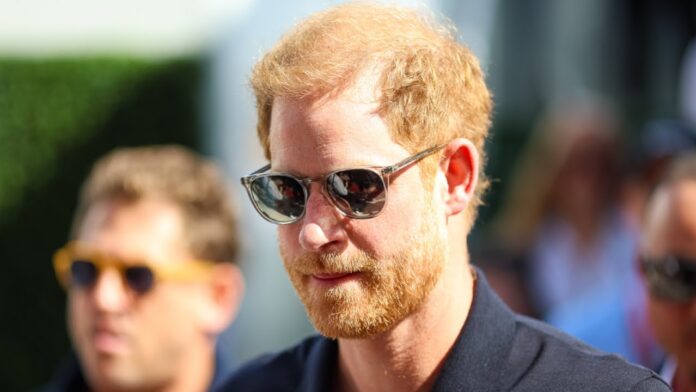Ex-friends accuse Prince Harry and Meghan Markle of disloyalty over their criticisms of the royal family, with some questioning their motives and longing for admiration
Prince Harry and Meghan Markle have faced sharp criticism from former friends over their public critiques of the Royal Family. The couple, who stepped back from their royal duties in 2020, have been vocal in their dissatisfaction with the monarchy through various platforms, including their 2021 interview with Oprah Winfrey, the Netflix series Harry & Meghan, and Harry’s memoir, Spare.
In recent remarks, several of Harry’s ex-friends have expressed their disappointment and disapproval. One former acquaintance, speaking ahead of Harry’s 40th birthday next month, criticized him for what they perceive as a series of disloyal actions. “I can’t believe he’d stoop so low,” the source said. “It’s outrageously disloyal. Oprah, Netflix, and then the book? Three strikes and you’re out.”
Embed from Getty ImagesThe criticism centres around the couple’s continuous attacks on the Royal Family and the handling of their departure from their royal roles. Since stepping away from their royal duties, Harry and Meghan have used their platforms to address personal grievances and allegations against the monarchy. This has included revelations about their strained relationships with senior royals and the challenges they have faced since leaving the UK.
Another former friend commented on Harry’s apparent dissatisfaction with his new life, suggesting that he misses the UK and the attention he once received. “He’s an angry boy. Things haven’t turned out how he wanted,” they said. “I think he misses being over here [in Britain] desperately and wants to be admired more. Anyone who knows him feels he’d rather be top of the pops here with everyone loving him, as they do with William and Kate.”
The criticisms extend beyond personal disapproval. A mutual friend of both Prince William and Harry voiced concerns about the couple’s approach to their new life and their public narrative. “Harry and Meghan could have left with dignity and decency and not trashed the institution,” they remarked. “The conclusion is they’ve made money from trashing his family.”
The backlash underscores the ongoing controversy surrounding the Duke and Duchess of Sussex. Their decision to leave royal duties and their subsequent revelations have polarized public opinion and strained relationships with former friends and allies. As Prince Harry approaches his milestone birthday, the reflections of those who once stood by him highlight the deep-seated tensions and the challenges of navigating life outside the royal spotlight.
Analysis:
Political:
Prince Harry and Meghan Markle’s continued criticism of the Royal Family can be seen as part of a broader political narrative about accountability and transparency within long-standing institutions. Their public statements challenge the traditional norms of royal conduct and the monarchy’s public image. This controversy reflects ongoing debates about the relevance and adaptability of monarchies in modern democratic societies. The Sussexes’ outspoken stance aligns with broader movements advocating for transparency and reform within established institutions, resonating with those who seek to question and redefine traditional power structures.
Social:
Socially, the criticism from Prince Harry’s former friends highlights the personal and public ramifications of high-profile departures from established institutions. The public’s fascination with Harry and Meghan’s story reflects societal interest in the dynamics of personal relationships, loyalty, and the impact of fame. The friends’ remarks emphasize the social expectations of maintaining respect and dignity, even in the face of personal grievances. This situation underscores the tension between personal authenticity and public perception, illustrating how public figures navigate the complexities of personal and professional boundaries.
Racial:
Racially, while the direct criticism from Harry’s former friends does not address racial issues explicitly, it intersects with broader conversations about race and representation within the Royal Family. The Sussexes’ departure and subsequent revelations have included discussions about race and how it influenced their experiences within the monarchy. The criticism of their public attacks may be viewed through the lens of how race and ethnicity intersect with public and private perceptions of loyalty and success within traditional institutions.
Gender:
Gender dynamics play a significant role in the controversy surrounding Harry and Meghan. Meghan Markle’s role in public criticism has been a focal point, particularly regarding how her experiences as a woman of colour intersect with her challenges within the Royal Family. The former friends’ comments reflect gendered expectations of how women should comport themselves in public spheres, particularly within traditional institutions. Meghan’s assertiveness and public critique challenge traditional gender roles and expectations within the monarchy, highlighting ongoing debates about gender and power in high-profile contexts.
Economical:
Economically, the Sussexes’ move to capitalize on their royal experiences through media projects and public engagements has drawn criticism for allegedly monetizing personal grievances. Their ventures, including book deals and exclusive interviews, represent a shift in how former royals leverage their experiences for financial gain. The backlash from former friends also reflects concerns about the commercialization of personal narratives and the ethics of profiting from public disputes. This economic aspect underscores the complex relationship between personal brand management and public perception in contemporary media landscapes.
